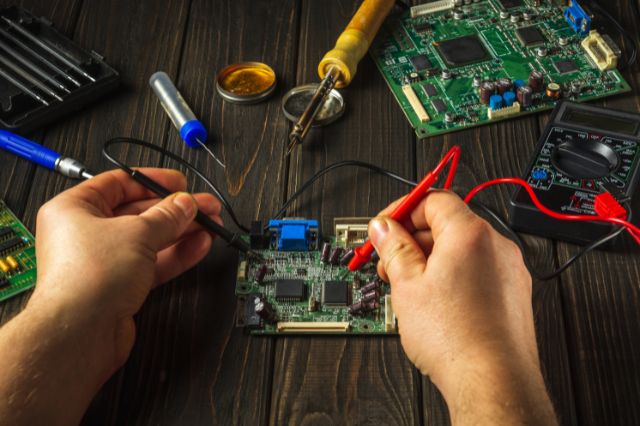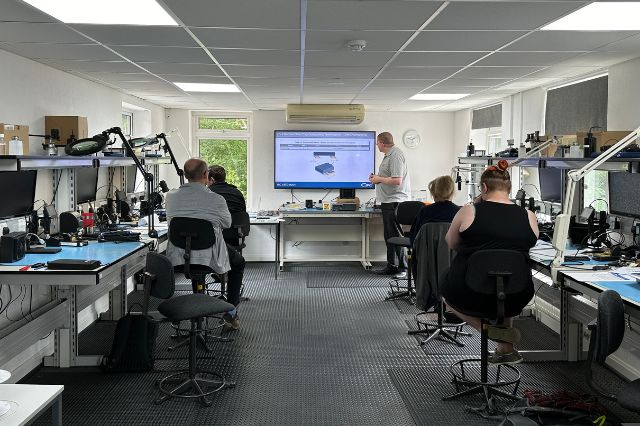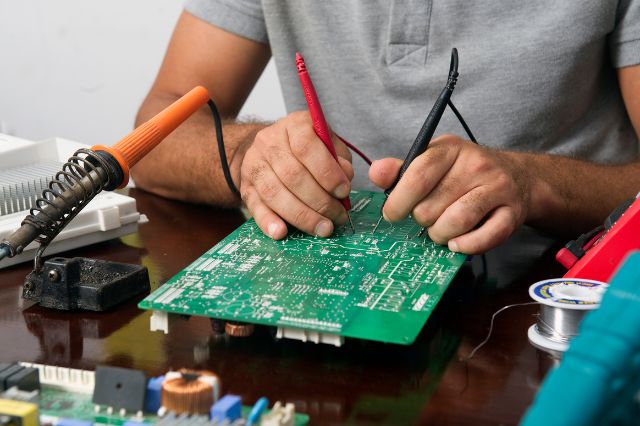So, you would like to improve your skills in Electronics? Well then you have come to the right place. At The Electronics Group we are specialists in IPC and Electronics Training and supporting the industry with its continuous need to improve and maintain the highest standards.
Whether you are a professional looking for creative ways to up your electronics game or a hobbyist looking to take your skills to the next level, we have got your back.
In this article we will explore some of the practical ways you can improve and grow your skills in electronics, starting right away. We will cover everything from understanding the basics, which online spaces to spend time in, which equipment to invest in, training courses and more.
How to Improve Your Skills in Electronics
Understanding the Basics of Electronics
The foundation of any educational pursuit in electronics starts with a solid understanding of the basics. This involves getting to grips with fundamental concepts like voltage, current, resistance, and the use of basic tools and components. You might think of this as getting your hands dirty, quite literally, with the building blocks of electronics.
Starting with simple projects that allow you to manipulate these elements can be immensely helpful. For instance, creating basic circuits that light up LEDs or power small motors can teach you about the flow of electricity and the role each component plays. Each project you undertake will build your confidence and competence.
At The Electronics Group we have a brand-new course aimed specifically at complete beginners. Our Introduction to Electronics Fundamentals course will teach you all of the basics of electronics over the course of 5 days. This is the perfect starting point for anyone new to electronics who is keen to get a great head start.
Practicing with Electronics Projects
Once you have the basics down, the next step is to apply your knowledge through hands-on projects. This is where theory meets practice, and you begin to see the real-world applications of your studies. Working on your own projects not only reinforces your understanding but also helps you to discover new interests within the field of electronics.
Consider starting with kits that challenge your skill level without being overwhelming. These kits typically come with instructions and all the necessary components, making it easy to get started. As you progress, you can begin customising these projects or even designing your own circuits.

Invest in the Correct Electronics Equipment
Investing in the right equipment is crucial for anyone serious about advancing their skills in electronics. High-quality tools not only make the learning process more enjoyable but also ensure accuracy and safety in your projects. Selecting the right equipment can be a game-changer in your electronics journey, enabling you to work on more complex and varied projects with confidence.
When starting out, the basics such as a good soldering iron, a digital multimeter, and a breadboard are indispensable. A reliable soldering iron with adjustable temperature settings allows for more precise soldering, which is fundamental in creating stable and durable electronic circuits. A digital multimeter is essential for diagnosing problems, verifying circuit behaviors, and learning about the electronic components you are working with. It’s your window into understanding the invisible forces at play within your circuits.
Investing in quality consumables such as wires, solder, and connectors is equally important. High-quality consumables can reduce frustration, as poor-quality materials often lead to unreliable connections and frequent need for repairs.
Joining Electronics Community Forums
No one is an island, especially in the vast sea of electronics. Try joining popular community forums such as Electronics Stack Exchange or EEVblog and groups on platforms like Facebook and LinkedIn. These can expose you to a wealth of knowledge and different perspectives that can enhance your understanding and skills. These communities are often filled with enthusiasts and professionals who are more than willing to share advice, solve problems, and provide feedback on your projects.
By participating in these forums, you can stay up-to-date with the latest developments in electronics, learn from the experiences of others, and even find mentorship opportunities. Engaging with a community can also keep you motivated and inspired as you continue your journey in electronics.
Continuing Professional Education
For those already in the electronics industry, continuing professional education is key to improving your skills in electronics. This could mean formal education such as certifications, workshops, and seminars. These educational opportunities help you stay competitive and knowledgeable about the latest technologies and industry standards.
At The Electronics Group, we provide a range of courses from the main IPC certifications to our bespoke range of Electronics Skills Courses. Our skills courses range from the Fundamentals for complete beginners to Electronic Fault Finding, Through-Hole and Surface Mount Soldering for both beginners and advanced and more.
These courses are a great way to deepen your expertise and network with other professionals in the field.

Exploring Advanced Electronics Topics
Once you have a comfortable handle on intermediate skills, diving into more advanced topics can be both challenging and rewarding. This might include learning about microcontrollers, digital signal processing, or even robotics. These areas offer expansive new avenues for application and innovation in electronics.
Each of these advanced topics introduces you to different aspects of electronics, potentially opening up new career opportunities or hobbyist pursuits.
For those looking for more advanced ways to improve their skills in electronics, we can deliver IPC Certification training to CSE and CIT level to take your career to the next step. We also have a range of advanced electronics skills courses that can be tailored to meet your specific requirements.
Applying Real-World Scenarios
To truly master electronics, applying your skills to real-world scenarios is crucial. This could involve troubleshooting and repairing devices you have at home, designing custom solutions for practical problems, or innovating new products. Real-world application not only tests your knowledge and skills in a practical setting but also enhances your problem-solving abilities.
Improve Your Skills in Electronics with The Electronics Group
Improving your skills in electronics is a continuous journey filled with exciting challenges and rewarding milestones. By starting with the basics, engaging in hands-on projects, using digital tools, and connecting with the community, you can steadily advance your knowledge and abilities.
Remember, every circuit completed, every problem solved, and every project finished brings you one step closer to mastering the field of electronics. Keep learning, stay curious, and connect with us at The Electronics Group to see how our courses can help you improve your skills, and which one is right for you.


